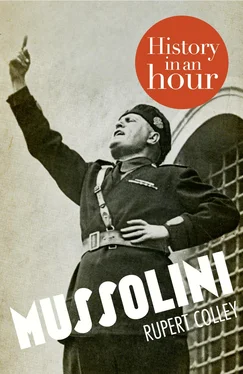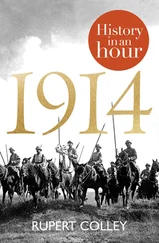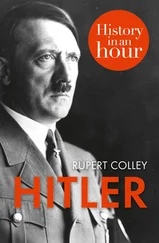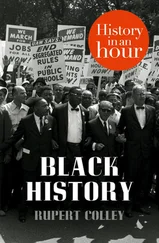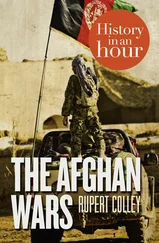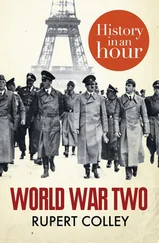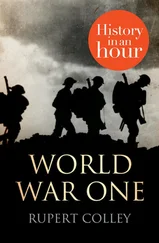Alessandro Mussolini.
The young Benito Mussolini was brought up under the twin gods of Marx and the Pope, forced to attend Mass on a regular basis and dragged by his father to the pub to meet his socialist friends. Neither influence did anything to curb his aggressive behaviour. ‘I was not a good boy,’ he freely admits in his 1928 autobiography; ‘I was, I believe, unruly.’ He helped Alessandro in the furnace where his father’s political fervour shaped his own outlook. But it was his mother he loved. ‘To displease her was my one fear,’ he wrote. Yet this fear did little to mend his ways. Unable to discipline her wayward and bullying son, his mother sent the 9-year-old Benito to an austere school run by Roman Catholic monks. The environment only heightened Benito’s awareness of his modest origins and humble means, and the strict routine made his behaviour worse. A loner, he got into fights and was, he said, ‘not very assiduous’. Eventually he was expelled for attempting to stab a fellow pupil and fighting one of the monks. Sent to a more relaxed school nearer to home, he fared no better and again was expelled for brandishing a knife at another student.
Education had done nothing to tame Benito’s disruptive conduct and at the age of 17 all he had to show for a decade of schooling were the abilities to play the trombone and speak in public. The latter was a skill that would serve him well in his coming career. The former, less so.
Despite his poor performance at school, in 1901 Mussolini qualified as a schoolteacher. The pay was poor and the work dreary. Teaching, he concluded, ‘did not suit me’. Meanwhile, Mussolini devoted much time to his twin passions, both inherited from his father – socialism and women. His looks and magnetism certainly attracted women, often the wives of other men, and often also resulting in fights.
Swiss police mug shot of Mussolini, 19 June 1903.
In June 1902, having already lost his teaching job as a result of an argument, short of money, and in an attempt to avoid conscription into Italy’s army, Mussolini moved to Switzerland. ‘There in Predappio, one could neither move nor think without feeling at the end of a very short rope … I felt the urge to escape.’ Arriving in Switzerland penniless (‘Courage was my one asset’), Mussolini worked in various manual jobs, moving frequently between accommodations. He became attached to a group of Marxists who encouraged him in his political education. He dabbled in journalism, joined a trade union and attended meetings where he enjoyed heckling and getting into arguments. His political agitation and calls for civil unrest and violence got him arrested and deported several times: ‘My words made me undesirable to the Swiss authorities.’ Each time he returned to Switzerland where the continued attention of the Swiss police did nothing to reform his ways. His stay in Switzerland was, he described, ‘a welter of difficulty’. Desperate and often hungry, Mussolini later confessed to having stolen food from two Englishwomen in Geneva: ‘I threw myself upon one of the old witches and grabbed the food from her hands. If they had made the slightest resistance, I would have strangled them.’
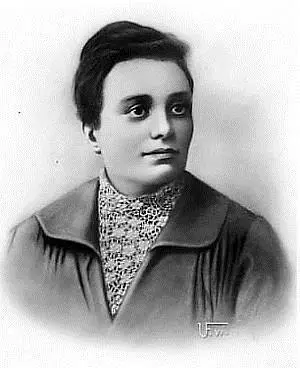
Rosa Mussolini.
In 1904, he returned to Italy permanently and despite having previously avoided conscription – for political reasons, he later claimed, rather than the lack of courage – he now voluntarily joined the Italian army, serving the required eighteen months. In February 1905, Mussolini’s 46-year-old mother died of meningitis, leaving him distraught. It was, he said, ‘the greatest sorrow of my life’.
Following his discharge from the army in September 1906, Mussolini’s existence consisted of drinking, womanizing, debt, contracting syphilis and avoiding the authorities. He returned to the teaching profession but still had no aptitude for it and a succession of temporary contracts were rarely extended. It was, as Mussolini described, a period of ‘moral deterioration’.
His enthusiasm for revolutionary socialism remained undimmed, albeit at the cost of often being deprived of his liberty for short periods of time. He read and argued, and wrote for and edited several socialist newspapers, haranguing the government, democracy, the capitalists, the middle classes and the Church in equal measure. In 1904, his hatred of the Church inspired Mussolini to write a pamphlet entitled God Does Not Exist , in which he described priests as ‘black microbes who are as fatal to mankind as tuberculosis germs’. In 1909, he went so far as to write an anti-clerical novel, The Cardinal’s Mistress .
In 1911, Mussolini, through his newspaper columns, led the protests against Italy’s war against Libya, denouncing it as an imperialist, capitalist conflict. His outspokenness earned him another spell in prison, this time for five months. But his fist-shaking, rabble-rousing rhetoric also earned him the attention of the country’s most influential socialists and he was soon being hailed as a rising star of Italy’s left. In December 1912, Mussolini received a lucky break when he was appointed editor of Italy’s national socialist newspaper, Avanti! (Forward). He excelled in his new role, sacking those whose views did not match his own firebrand vision of socialism, increasing the newspaper readership fivefold, and relishing the opportunity of writing as he saw fit and having his views heard throughout the country.
First World War CONTENTS Cover Title Page Mussolini History in an Hour Rupert Colley Introduction Risorgimento Early Years First World War Mutilated Victory The March on Rome The Matteotti Crisis Totalitarianism Mussolini and the Pope The Duce’s Cult of Personality Mussolini’s Women Anti-Semitism Mussolini’s Foreign Adventures Mussolini’s Wars Austria, Czechoslovakia and Albania War Mussolini’s Downfall The Rescue of Mussolini The Italian Social Republic Execution of Mussolini The Italian Holocaust Mussolini’s Body Appendix 1: Key People Appendix 2: Timeline Copyright Got Another Hour? About the Publisher
The outbreak of war in July 1914 saw Italy divided on whether to support the war or not. Since 1882, Italy had been part of the Triple Alliance with Germany and Austria-Hungary. But the treaty was a defensive one, and in 1914 Italy was able to argue that by declaring war on Serbia, Austria had acted aggressively, thus nullifying Italy’s obligations. Mussolini was firmly non-interventionist, arguing that, as an imperialist conflict, war pitted the working classes of one nation against those of another. ‘Let a single cry arise from the vast multitudes of the proletariat and let it be repeated in the squares and streets of Italy: down with war!’ Yet, within months, he had changed his mind. Not unlike Russia’s Bolsheviks, many within Italian socialist circles, including Mussolini, saw war as an opportunity for revolution and an overturning of Italy’s bourgeois government. Others felt that Italy should not miss out on the opportunity provided by war to enhance its prestige and assert its place in the world.
Again, Mussolini used his influence as editor of Avanti! to voice his views: ‘It is to you, young men of Italy … that I address my call to arms … Today I am forced to utter loudly and clearly in sincere good faith the fearful and fascinating word – war!’
Mussolini’s new view of war put him in conflict with Italy’s more moderate socialists and resulted in his expulsion from the party. ‘You cannot get rid of me because I am and always will be a socialist. You hate me because you still love me.’
Читать дальше
